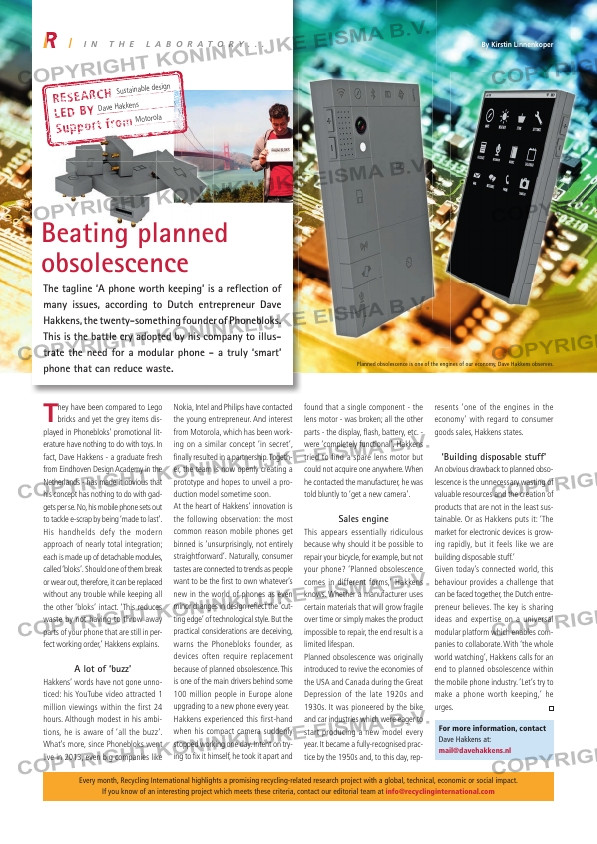Page 49 from: January / February 2014

I N T H E L A B O R A T O R Y . . .
resents ‘one of the engines in the
economy’ with regard to consumer
goods sales, Hakkens states.
‘Building disposable stuff’
An obvious drawback to planned obso-
lescence is the unnecessary wasting of
valuable resources and the creation of
products that are not in the least sus-
tainable. Or as Hakkens puts it: ‘The
market for electronic devices is grow-
ing rapidly, but it feels like we are
building disposable stuff.’
Given today’s connected world, this
behaviour provides a challenge that
can be faced together, the Dutch entre-
preneur believes. The key is sharing
ideas and expertise on a universal
modular platform which enables com-
panies to collaborate. With ‘the whole
world watching’, Hakkens calls for an
end to planned obsolescence within
the mobile phone industry. ‘Let’s try to
make a phone worth keeping,’ he
urges.
They have been compared to Lego bricks and yet the grey items dis-
played in Phonebloks’ promotional lit-
erature have nothing to do with toys. In
fact, Dave Hakkens – a graduate fresh
from Eindhoven Design Academy in the
Netherlands – has made it obvious that
his concept has nothing to do with gad-
gets per se. No, his mobile phone sets out
to tackle e-scrap by being ‘made to last’.
His handhelds defy the modern
approach of nearly total integration;
each is made up of detachable modules,
called ‘bloks’. Should one of them break
or wear out, therefore, it can be replaced
without any trouble while keeping all
the other ‘bloks’ intact. ‘This reduces
waste by not having to throw away
parts of your phone that are still in per-
fect working order,’ Hakkens explains.
A lot of ‘buzz’
Hakkens’ words have not gone unno-
ticed: his YouTube video attracted 1
million viewings within the first 24
hours. Although modest in his ambi-
tions, he is aware of ‘all the buzz’.
What’s more, since Phonebloks went
live in 2013, even big companies like
found that a single component – the
lens motor – was broken; all the other
parts – the display, fl ash, battery, etc. –
were ‘completely functional’. Hakkens
tried to find a spare lens motor but
could not acquire one anywhere. When
he contacted the manufacturer, he was
told bluntly to ‘get a new camera’.
Sales engine
This appears essentially ridiculous
because why should it be possible to
repair your bicycle, for example, but not
your phone? ‘Planned obsolescence
comes in different forms,’ Hakkens
knows. Whether a manufacturer uses
certain materials that will grow fragile
over time or simply makes the product
impossible to repair, the end result is a
limited lifespan.
Planned obsolescence was originally
introduced to revive the economies of
the USA and Canada during the Great
Depression of the late 1920s and
1930s. It was pioneered by the bike
and car industries which were eager to
start producing a new model every
year. It became a fully-recognised prac-
tice by the 1950s and, to this day, rep-
Nokia, Intel and Philips have contacted
the young entrepreneur. And interest
from Motorola, which has been work-
ing on a similar concept ‘in secret’,
fi nally resulted in a partnership. Togeth-
er, the team is now openly creating a
prototype and hopes to unveil a pro-
duction model sometime soon.
At the heart of Hakkens’ innovation is
the following observation: the most
common reason mobile phones get
binned is ‘unsurprisingly, not entirely
straightforward’. Naturally, consumer
tastes are connected to trends as people
want to be the fi rst to own whatever’s
new in the world of phones as even
minor changes in design refl ect the ‘cut-
ting edge’ of technological style. But the
practical considerations are deceiving,
warns the Phonebloks founder, as
devices often require replacement
because of planned obsolescence. This
is one of the main drivers behind some
100 million people in Europe alone
upgrading to a new phone every year.
Hakkens experienced this first-hand
when his compact camera suddenly
stopped working one day. Intent on try-
ing to fi x it himself, he took it apart and
The tagline ‘A phone worth keeping’ is a reflection of
many issues, according to Dutch entrepreneur Dave
Hakkens, the twenty-something founder of Phonebloks.
This is the battle cry adopted by his company to illus-
trate the need for a modular phone – a truly ‘smart’
phone that can reduce waste.
By Kirstin Linnenkoper
Every month, Recycling International highlights a promising recycling-related research project with a global, technical, economic or social impact.
If you know of an interesting project which meets these criteria, contact our editorial team at [email protected]
For more information, contact
Dave Hakkens at:
[email protected]
RESEARCH
LED BY
Support fro
m
Sustainable de
sign
Dave Hakkens
Motorola
Planned obsolescence is one of the engines of our economy, Dave Hakkens observes.
Beating planned
obsolescence
RI-1-2014-In the laboratory.indd 49 30-01-14 09:08



